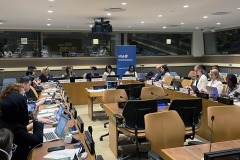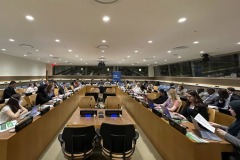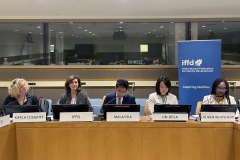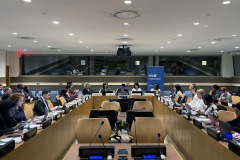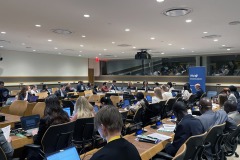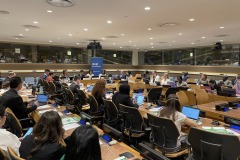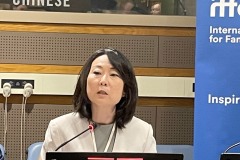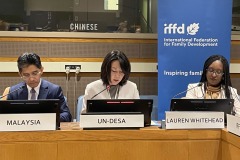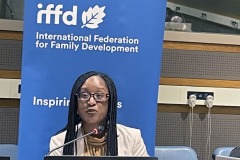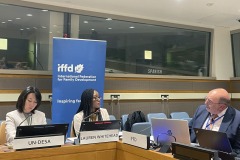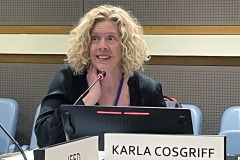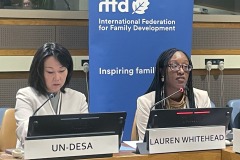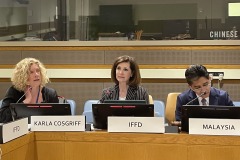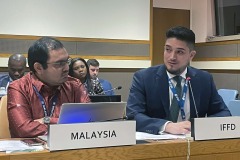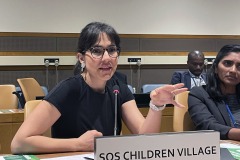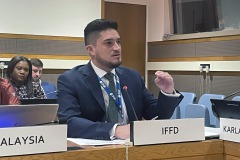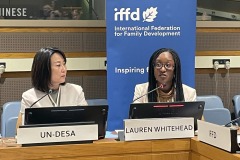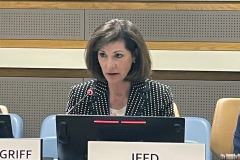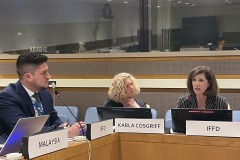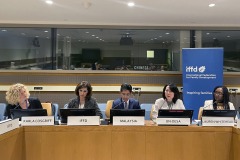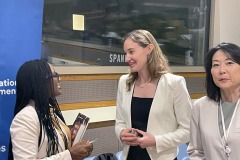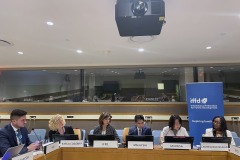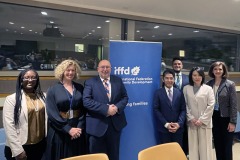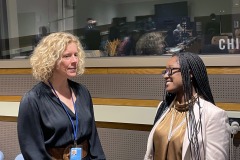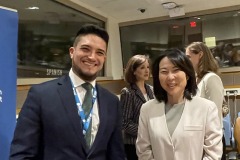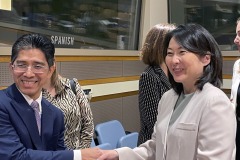


Better population outcomes
Parenting education and new technologies

Side-Event during the 56th session of the UN Commission on Population and Development
Organized by the International Federation for Family Development
Co-sponsored by the Permanent Mission of Malaysia to the United Nations

Thursday, April 13th, 2023 – 1.15 – 2.30 PM
UN Headquarters NYC – Conference Room 5

BACKGROUND NOTE
In recent years the United Nations system has witnessed substantial progress when addressing constructive topics for better population outcomes related to informal education and skill-building programs, such as parenting support and education. Recommendations from the Secretary General’s Report and program implementation from ILO, UNICEF, WHO and UNESCO have shown a direct impact on mental health for all family members, child well-being, family cohesion and breaking the intergenerational cycle of poverty [1]. In this regard, the ICPD Programme of Action, Chapter 2, Principle 10 reads: “The best interests of the child shall be the guiding principle of those responsible for his or her education and guidance; that responsibility lies in the first place with the parents.” Or paragraph 5.9 – “Governments […] should support educational programmes concerning parental roles, parental skills and child development”. [2]
The event will follow up on the theme of the Commission on Population and Development focusing on education [3]; the impact of new technologies and families in achieving SDG4 [4]; and the latest resolution on the Preparations of the International Year of the Family in 2024 [5]. Member States, UN-System, Civil Society and experts will explore better ways to achieve SDG4 through improving digital literacy and investing in parenting education support programs. The recommendations will feed into the Preparations for the 30th Anniversary of the International Year of the Family.
Investing in parenting education has policy implications and so it should rightly be perceived as an effective and useful strategy for enabling parents to improve their skills to face the challenges of child-rearing. Furthermore, parenting education constitutes a strategy for preventing negative behaviors, such as corporal punishment, and should be an integral component of a set of methods for the creation of an infrastructure for parents. Moreover, parenting education constitutes a strategy towards realizing several of the Sustainable Development Goals and associated targets, especially those related to health and education. [6]
Member States and relevant stakeholders, as part of the preparations for the thirtieth anniversary of the International Year of the Family, within the area of technological change and its impact on families, are called to bridge the digital divide, including between developed and developing countries, as well as the gender digital divide, to enable equal access to risk-informed information, knowledge and communications, by taking concrete measures to promote equal access for all to digital training, capacity-building, through equal access to information and communications technologies, mobile devices and the Internet, higher-speed Internet and digital devices for families, especially those in vulnerable situations, invest in the digital literacy skills of all family members, invest in parenting education, including through the use of technology, as a valuable preventive strategy against cyberbullying and violence against children in digital contexts and for reducing child neglect, and support the healthy development of children, as part of child-focused policies and as a component of broader family-oriented policies and programmes. [7]
At the International Federation for Family Development, we have been promoting the use of new technologies during the past years in two ways: to improve internal communication with and among our centers and to develop online modalities of our successful courses, that before the pandemic was held only presentially. This process has given us a deeper knowledge and competence in our work with parents and families worldwide.

OPENING REMARKS
Abdul Shukur Abdullah
Director-General of the National Population and Family Development Board
MALAYSIA
Throughout the implementation of the current Malaysia Development Plan, the Government through the National Population and Family Development Board (NPFDB) has further enhanced parenting education and skills for Malaysian families. Various programs and services have been implemented such as premarital education, marriage enrichment and parenting skills for parents with young children and teenagers, fatherhood, adolescent development and counseling services. The new family policy will continuously emphasize in advocating the concept of family well-being based on family values.
The digital gap needs to be addressed as it will influence the stability of the family institution. Overcoming the digital divide can be assessed by increasing the percentage of internet use. Furthermore, there is an increase in children aged 5-17 years old using the internet. To make the situation even more alarming, parents’ awareness of parental control has decreased, and governments should encourage the use of parental control services to protect children when browsing the internet. [8]
INTRODUCTORY REMARKS
Masumi Ono
Chief of the Social Inclusion and Participation Branch
DISD UN-DESA
With new technologies entering our lives, parenting becomes all the more complicated. The dark side of technology brings risks to children by way of cyberbullying, violent content, online predators, etc. It is important for parenting education to help equip parents to deal with the impact of technology on child development. Digital tools can help parents access information, connect with other parents and better raise children in a digital age. [9]
Parenting education is a powerful tool against child abuse and it can promote secure environment, encourage capable caregiving by parents and improve support for families, connecting them to health and social services. In some countries, family cash transfers have been linked to parenting education classes compulsory for both mothers and fathers, resulting in better outcomes for children. [10]
An important aspect of parenting education is positive parenting to promote a continual relationship including caring, teaching, leading, communicating and consistently providing for the needs of a child. It relies on affection, responsiveness, encouragement and teaching; it supports a child’s capabilities, interests and overall cognitive development, and reduces behavior problems, depressive symptoms and risky behaviors. [11] It fosters children’s high self-esteem, sense of belonging and academic achievement.

INTERACTIVE DISCUSSION
Lauren Whitehead
Social Protection and Gender Lead / Family-Friendly Policies and Care Co-lead
UNICEF
“Family-Friendly Policies and Care”
Nora Urrea
World Vice President
International Federation for Family Development (IFFD)
“Parenting Support Programmes”
Karla A. Cosgriff
Head of New York Regional Office
Common Sense Media
“Parenting in the digital age”
MODERATION & WRAP-UP
José Alejandro Vázquez
Strategic Partnerships Coordinator
IFFD
Questions for the speakers
(2 minutes each)
1. Could you mention a key policy recommendation that governments should take into account to support parents to improve their children’s lifelong learning?
Take into account non-formal and complementary educational programmes to support parents as they improve their skills in child-rearing contributing to children’s well-being, intergenerational bonding and social cohesion.
Invest in four core tasks through family-friendly policies: child benefits and adequate wages for parents; paid parental leave for both parents; breastfeeding support; and access to affordable, quality childcare.
Hold content and platform creators accountable for the impact of their products on children. Help them better design algorithms responsive to mental health, citizenship values and parental care.
2. Can you name a cost-effective measure to support parents for better population outcomes in the digital era?
Provide digital literacy to parents and skill-building strategies to help them become more comfortable with technology and enable them to guide their children through challenges such as screen time, cyberbullying, addictions and privacy concerns.
National policies to facilitate parents and caregivers to care and dedicate time to their children and develop the essential parent-child bond from the earliest days.
Communication between parents and children to build up trust and exchange knowledge of content and time spent in new technologies.
3. How can governments, academia, parents and UN agencies work together in designing, implementing and evaluating policies to improve population outcomes?
Offer support to working parents through expanded child and family benefits, paid family leave and sick leave, improved flexibility of working arrangements and investments in parenting education, endorsing the programs and encouraging their participation.
UN agencies, governments, the private sector, and civil society are joining forces to the realization of family-friendly policies at work: UN agencies developing standards, based on best practices and evidence and coordinating multi-sectoral responses.
Promote research focusing on the mental health impact of new technologies on parents and children. Inform peer-to-peer curricula to better design content for children.
[1] Integrated Results and Resources Framework of the UNICEF Strategic Plan, 2022–2025, www.undocs.org/E/ICEF/2021/25/Add.1
[2] International Conference on Population and Development, www.undocs.org/A/CONF.171/13
[3] Expert group meeting on population, education and sustainable development, https://www.un.org/development/desa/pd/events/cpd56-egm
[4] Implementation of the objectives of the International Year of the Family and its follow-up processes Report of the Secretary-General, www.undocs.org/A/77/61
[5] Preparations for and observance of the thirtieth anniversary of the International Year of the Family, www.undocs.org/A/C.3/77/L.15/Rev.1
[6] Implementation of the objectives of the International Year of the Family and its follow-up processes Report of the Secretary-General (47), www.undocs.org/A/77/61
[7] Preparations for and observance of the thirtieth anniversary of the International Year of the Family (OP6), www.undocs.org/A/C.3/77/L.15/Rev.1
[8] The CyberSafe Malaysia Programme or The Safety Education for Family and Children programme.
[9] Implementation of the objectives of the International Year of the Family and its follow-up processes Report of the Secretary-General, www.undocs.org/A/77/61
[10] A/76/61-E/2021/4, A/77/61-E/2023/4, www.undocs.org/A/76/61
[11] A/76/61-E/2021/4, A/77/61-E/2023/4, www.undocs.org/A/76/61



